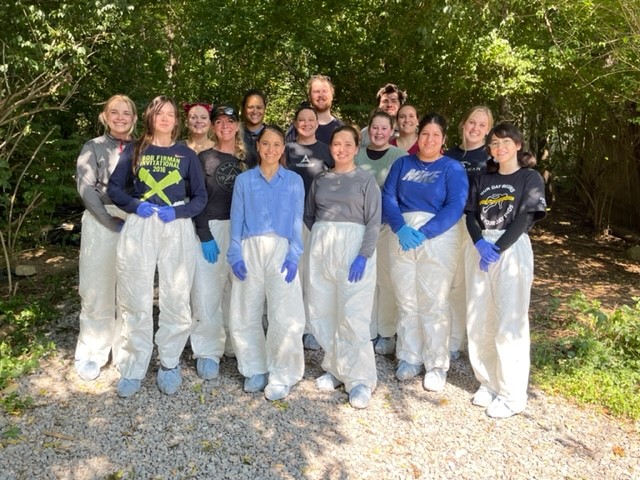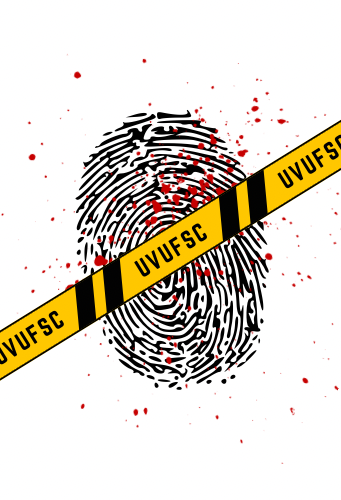As a student within our Bachelors degree program, it is our goal to set each individual up for success. Part of that process includes providing important instructions, policies, guidelines and procedures that students should be aware of while they are enrolled in our degree program. Our program has created a "Student Handbook" that has complied all vital information for our students. This resource contains program requirements, academic standards, student support services, and much more. All students matriculating into the Bachelors program are required to read and abide by the handbook.
UVU’s Forensic Science program provides students with valuable internship opportunities with local, state and federal agencies within the state of Utah. Our students have interned with Utah County Sheriff’s Office, Utah Department of Public Safety Crime Laboratory, Salt Lake Police Department, Utah Office of the Medical Examiner among many others.
Internships provide an avenue for students to gain knowledge, skills and experience in a real-world environment and from within their field of study. Students form invaluable relationships within the field and gain access to career resources for furthering their employment in forensics.
Students must coordinate with the internship office to receive credit
Loading Directory data....
Students can contact the following people to look for possible internships.
UTAH VALLEY UNIVERSITY - JOB SHADOW
UVU Alumni Job Shadow Program
LOCAL UTAH AGENCIES
Utah County Sheriff’s Office
Email applications to Craig Gaines
Salt Lake City Crime Lab
Interns are selected at the beginning of each calendar year for the upcoming Summer, Fall and Spring semesters. Applications are accepted from Oct-Nov each year with interviews occurring in January.
Angela Petersen
Unified Police Department
UPD is currently not accepting applications. Application window will re-open later this year
Salt Lake County Sheriff's Office
American Fork Police Department
Adam Ellison
Berg Mortuary (PAID)
Todd Jenkins
SMRTL - Sports Medicine Research and Testing Lab (Forensic Laboratory Students ONLY)
Elizabeth Chesna
UTAH STATE AGENCIES
DPS – Utah State Crime Lab Chemistry Department (Forensic Laboratory students ONLY)
Utah Office of the Medical Examiner
Medicolegal Death Investigator
Morgue/Autopsy
Utah Department of Forensic Toxicology (Forensic Laboratory Students ONLY)
Nghia Nguyen
non profit organizations
Utah Cold Case Coalition
Karra Porter
OTHER STATE AGENCIES
Colorado Bureau of Investigation
Tennessee Bureau of Investigation
Forensic Organizations
International Association of Identification
Crime Scene Investigator Network
The Center for Forensic Science Research and Education
FEDERAL AGENCIES
Naval Criminal Investigative Service
Federal Bureau of Investigations
Drug Enforcement Administration
Kimberly Setchfield
Secret Service Student Volunteer Program
Bureau of Alcohol, Tobacco, Firearms and Explosives
Department of Justice
UNIVERSITY INTERNSHIP RESOURCES


Undergraduate research is available in the UVU Forensic Science Program. A typical research student is a junior with at least one year remaining until graduation and who is interested in going to graduate school. The program is conducted like a Master of Science Degree program with close one-on-one supervision involving a literature search, experimental design, experimentation, data interpretation, and final report. Although research topics are developed jointly with the mentor the student’s interest is followed as closely as possible.
The typical timeline starts in January at the beginning of spring semester, by March the topic and literature search is finished, and by the beginning of May experimentation is underway. Research continues through the summer because abstracts must be submitted to the American Academy of Forensic Sciences by August 1. The work is presented at the annual academy meeting the following February.
If you are a forensic science student and wish to file a complaint based on an issue with your degree program, specific courses, faculty member or any other issue related to the forensic science program, please submit your complaint through the complaint portal below.
EthicsPoint is a confidential internet and telephone-based reporting tool, with the option of anonymous reporting, that helps UVU and its employees work together to address fraud, abuse, misconduct, or other violations in the workplace. EthicsPoint is managed at UVU by Internal Audit, who are independent of UVU's management team. https://www.uvu.edu/audit/concerns/
UVU has several other resources available to students for reporting various types of issues you may have as a student at UVU. The following are direct links of how to submit concerns you may have, which may or may not be directly related to the forensic program
Provides students with instructions on reporting anything from Bias Education Support, Ombudsman, Student Conduct and Conflict Resolution, Title IX and much more.
For any misunderstandings or disagreements that need resolution.
For students to report ethical, policy, legal, financial issues or concerns.
If you feel that you have experienced sexual misconduct, discrimination, harassment, or retaliation, you have several options available to you. The Office for Equal Opportunity, Affirmative Action, and Title IX is here to offer support and resources to address your concerns through informal or formal options.
Careers related to forensic science are projected to grow 17% over the next ten years, much faster than the average for other occupations. Local, State and Federal Agencies have job openings in multiple disciplines within forensic science. Specific locations such as a crime laboratory, crime scene unit, medical examiners office or law enforcement agencies offer a wide variety of positions to choose from.
Students should consult early with their advisors and professors to identify the best path for their interests and ultimate career goals. With two separate emphases to choose from, students need to understand which educational focus can provide them with the best opportunity for their desired employment. As a requirement of employment, these careers will require that a background check be conducted as part of the application and hiring process. Background checks usually consist of any misdemeanor and felony level convictions, pending criminal cases, civil judgments, arrests, drug use, educational and employment background.
Forensic Investigation students will receive the educational and practical knowledge to secure employment in careers such as a crime scene investigator, medicolegal death investigator, latent print examiner, impression evidence examiner and firearms/ballistic evidence examiner.
Students completing the Forensic Laboratory emphasis will obtain education for working in disciplines such as a criminalist, forensic chemist, toxicologist, drug analyst, forensic technician or forensic scientist.
For various job postings in forensic science, see
IAI (International Association for Identification)
AAFS (American Academy of Forensic Sciences)
For more information, contact
Criminal Justice Department
801.863.7230
or
Career Development Center
801.863.6364
Students pursuing a career in the forensic sciences become involved in opportunities that allow them to expand their forensic experiences beyond their education. Professional organizations allow individuals to network, obtain up to date advances in the forensic field, and attend annual meetings of professional forensic science organizations. Many different organizations provide students with this type of association. Several organizations even offer student memberships that can eventually be converted to professional status once the student is employed in the field.
*Student memberships available